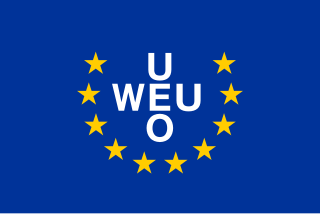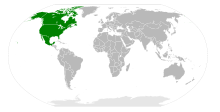
The Western European Union was the international organisation and military alliance that succeeded the Western Union (WU) after the 1954 amendment of the 1948 Treaty of Brussels. The WEU implemented the Modified Brussels Treaty. During the Cold War, the Western Bloc included the WEU member states and the United States and Canada as part of the North Atlantic Treaty Organization (NATO).

John Paul Manley is a Canadian lawyer, businessman, and politician who served as the eighth deputy prime minister of Canada from 2002 to 2003. He served as Liberal Member of Parliament for Ottawa South from 1988 to 2004. From January 2010 to October 2018 he was president and CEO of the Business Council of Canada. He is currently the Chairman of the Canadian Imperial Bank of Commerce (CIBC) and serves on the advisory board of the Leaders' Debates Commission.

Argeo Paul Cellucci was an American politician and diplomat from the Commonwealth of Massachusetts. A Republican, he served as the 69th governor of Massachusetts from 1999 to 2001, and as the United States Ambassador to Canada from 2001 to 2005. He also served as the Commonwealth's 68th lieutenant governor from 1991 to 1999, as well as in the Massachusetts House of Representatives and Senate from 1977 to 1991.

The North American monetary union is a theoretical economic and monetary union of three North American countries: Canada, the United States of America and Mexico.

Carla Anderson Hills is an American lawyer and a public figure. A member of the Republican Party, she previously served as the 5th United States Secretary of Housing and Urban Development under President Gerald Ford from 1975 to 1977 and as the 10th United States Trade Representative under President George H. W. Bush from 1989 to 1993. Hills was the first woman to hold each of those posts, the third woman ever to serve in a presidential cabinet, and the first appointed to both cabinet and cabinet-rank positions.

The economy of North America comprises more than 596 million people in its 24 sovereign states and 15 dependent territories. It is marked by a sharp division between the predominantly English speaking countries of Canada and the United States, which are among the wealthiest and most developed nations in the world, and countries of Central America and the Caribbean in the former Latin America that are less developed. Mexico and Caribbean nations of the Commonwealth of Nations are between the economic extremes of the development of North America.
The Eurasian Economic Community was a regional organisation between 2000 and 2014 which aimed for the economic integration of its member states. The organisation originated from the Commonwealth of Independent States (CIS) on 29 March 1996, with the treaty on the establishment of the Eurasian Economic Community signed on 10 October 2000 in Kazakhstan's capital Astana by Presidents Alexander Lukashenko of Belarus, Nursultan Nazarbayev of Kazakhstan, Askar Akayev of Kyrgyzstan, Vladimir Putin of Russia, and Emomali Rahmon of Tajikistan. Uzbekistan joined the community on 7 October 2005, but later withdrew on 16 October 2008.

The Security and Prosperity Partnership of North America (SPP) was a supra-national level dialogue with the stated purpose of providing greater cooperation on security and economic issues. The Partnership was founded in Waco, Texas, on March 23, 2005, by Prime Minister of Canada Paul Martin, President of Mexico Vicente Fox, and U.S. President George W. Bush. It was the second of such regional-level initiatives involving the United States following the 1997 Partnership for Prosperity and Security in the Caribbean (PPS).
A continental union is a regional organization which facilitates pan-continental integration. Continental unions vary from collaborative intergovernmental organizations, to supranational politico-economic unions. Continental unions are a relatively new type of political entity in the history of human government. Throughout most of human history, political organization has been at the local level and in more recent centuries, the sub-regional ("regional")/sub-continental level ; however, starting with the advent of better transportation, weapons and communication there was for the first time the ability for a union of member states to organize at the continental level. After the devastation of the First and Second World Wars in the middle of the twentieth century, Europe began to slowly integrate with the founding of the "European Community", which became a political union covering much of the European continent.
In international relations, regionalism is the expression of a common sense of identity and purpose combined with the creation and implementation of institutions that express a particular identity and shape collective action within a geographical region. Regionalism is one of the three constituents of the international commercial system.
The North American Forum is an annual meeting of U.S., Canadian and Mexican government and business representatives to discuss issues related to continental economic and social integration. The Forum is chaired jointly by former United States Secretary of State George Shultz, former Mexican Finance Minister Pedro Aspe, and former Alberta premier Peter Lougheed.
The North American Competitiveness Council (NACC) was an official tri-national working group of the Security and Prosperity Partnership of North America (SPP). It was created at the second summit of the SPP in Cancún, Quintana Roo, Mexico, in March 2006. The SPP is an agreement between the leaders of the United States, Canada and Mexico to work towards a more integrated North American economy and security region. Composed of 30 corporate representatives from some of North America's largest companies, the North American Competitiveness Council has been mandated to set priorities for the SPP and to act as a stable driver of the integration process through changes in government in all three countries.
Robert Alan Pastor was a member of the National Security Council staff and a writer on foreign affairs.

The North American Union (NAU) is a theoretical economic and political continental union of Canada, Mexico and the United States, the three largest and most populous countries in North America. The concept is loosely based on the European Union, occasionally including a common currency called the amero or the North American Dollar. A union of the North American continent, sometimes extending to Central and South America, has been the subject of academic concepts for over a century, as well as becoming a common trope in science fiction. One reason for the difficulty in realizing the concept is that individual developments in each region have failed to prioritize a larger union. Some form of union has been discussed or proposed in academic, business, and political circles for decades. However, government officials from all three nations say there are no plans to create a North American Union and that no agreement to do so has been proposed, much less signed. The formation of a North American Union has been the subject of various conspiracy theories.
The trade relationship of the United States with Canada is the largest in the world. In 2016, the goods and services trade between the two countries totalled $627.8 billion. U.S. exports were $320.1 billion, while imports were $307.6 billion. The United States has a $12.5 billion trade surplus with Canada in 2016. Canada has historically held a trade deficit with the United States in every year since 1985 in net trade of goods, excluding services. The trade relationship between the two countries crosses all industries and is vitally important to both nations' success as each country is one of the largest trade partners of the other.

Werner Hoyer is a German economist and politician of the Free Democratic Party (FDP) who is currently serving as the President of the European Investment Bank.
North American integration is the process of economic and political integration in North America, particularly integration of Canada, Mexico, and the United States.
Maurice Sonnenberg has served as an outside advisor to five Presidential Administrations in the areas of international trade, finance, international relations, intelligence, and foreign election monitoring.

This article outlines the history of the Common Security and Defence Policy (CSDP) of the European Union (EU), a part of the Common Foreign and Security Policy (CFSP).

The European Union (EU) and the North Atlantic Treaty Organisation (NATO) are two main treaty-based Western organisations for cooperation between member states, both headquartered in Brussels, Belgium. Their natures are different and they operate in different spheres: NATO is a purely intergovernmental organisation functioning as a military alliance, which serves to implement article 5 in the North Atlantic Treaty on collective territorial defence. The EU on the other hand is a partly supranational and partly intergovernmental sui generis entity akin to a confederation that entails wider economic and political integration. Unlike NATO, the EU pursues a foreign policy in its own right—based on consensus, and member states have equipped it with tools in the field of defence and crisis management; the Common Security and Defence Policy (CSDP) structure.












